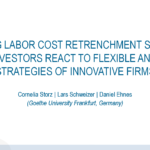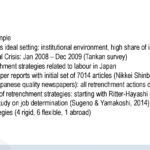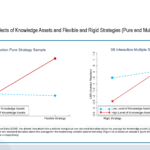
Download
Anmeldung
This is a past event. Registration is no longer possible.
Please subscribe to our DIJ Newsletter to stay informed about our research activities, events, and publications:
Comparing Labour-Cost Retrenchments in Times of Crisis: How Investors React to the Flexible and Rigid Strategies of Innovative Firms
8. September 2022
Cornelia Storz, Goethe University Frankfurt
Building on signalling theory and guided by the neo-institutional and resource-based view, this presentation analysed two research questions: (1) What are the effects of “flexible retrenchment strategies” (such as wage-based and functional flexibility) on investor reactions as compared to “rigid strategies” (such as pure downsizing)? (2) How do a firm’s knowledge assets shape the relationship between investor reactions to flexible strategies as compared to rigid strategies? This research gap is surprising because firms in many advanced economies extensively practice flexible retrenchment strategies to quickly react to a crisis or to adjust to organisational decline in order to lower labour costs. Using a novel data set of 242 retrenchment announcements by Japanese firms, we find that the announcement of flexible strategies is significantly and positively associated with a higher likelihood that the firm value of retrenchers increases. We attribute this effect to the circumstance that flexible strategies are perceived as an integrity signal: that is, as an effort to align with the norms of the broader institutional environment. Further, flexible strategies are significantly and more positively evaluated if they protect knowledge assets. This finding suggests that investors perceive flexible strategies as a capability signal, rewarding innovative firms depending heavily on the knowledge of their employees.
This session brought together scholars from various fields of research, including management, labour economics, and political science. Following Professor Storz’ presentation, the participants discussed the methodology, research design, and implications for the labour market of the paper.
Cornelia Storz holds the Chair of Innovation and Entrepreneurship at Goethe University Frankfurt. Her research focuses on how incumbents and entrepreneurs innovate, how universities stimulate knowledge creation, and how organisations are facilitated by their institutional environment. Her publications appeared in Research Policy, The Journal of Technology Transfer, Small Business Economics, and Asia Pacific Journal of Management. She was co-guest editor of a special issue on “Path Dependence and Emergence of New Industries” of Research Policy. Her research has been supported by the German Research Foundation, the Volkswagen Foundation, and the Japanese Society for the Promotion of Science.



